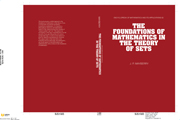Summary
Dancing Master: All the troubles of mankind, all the miseries which make up history, all the blunders of statesmen, all the failures of great captains – all these come from not knowing how to dance.
Le Bourgeois Gentilhomme, Act 1, Scene 2The importance of set-theoretical foundations
The discovery of the so-called “paradoxes” of set theory at the beginning of the twentieth century precipitated a profound crisis in the foundations of mathematics. This crisis was the more serious in that the then new developments in the theory of sets had allowed mathematicians to solve earlier difficulties that had arisen in the logical foundations of geometry and analysis. More than that, the new, set-theoretical approach to analysis had completely transformed that subject, allowing mathematicians to make rapid progress in areas previously inaccessible (in the theory of measure and integration, for example).
All of these advances seemed to be placed in jeopardy by the discovery of the paradoxes. Indeed, it seemed that mathematics itself was under threat. Clearly a retreat to the status quo ante was not an option, for serious difficulties once seen cannot just be ignored. But without secure foundations – clear concepts that can be employed without prior definition and true principles that can be asserted without prior justification – the very notion of proof is undermined. And, of course, it is the demand for rigorous proof that, since the time of the Greeks, has distinguished mathematics from all of the other sciences.
- Type
- Chapter
- Information
- The Foundations of Mathematics in the Theory of Sets , pp. x - xxPublisher: Cambridge University PressPrint publication year: 2001

